Featured Articles
Atlantic City Gala Recalls Good Times Perhaps Lost Forever

The mostly middle-aged crowd at 23 East, a bar in Ardmore, Pa., on Philadelphia’s Main Line, was clearly into the live rock ’n’ of a stage show headlined by Tommy Conwell, the front man for a popular local group from the 1980s, Tommy Conwell & the Young Rumblers.
“The ’80s are coming back!” Conwell yelled into the microphone, to the approval of his relatively small but enthusiastic audience. And maybe that really can be the case to some degree. There always are going to be music lovers who choose to remain rooted in the sounds of their youth because, well, thinking of the Young Rumblers as still being young is a convenient way of forgetting the graying or thinning of their own hair, or the formation of spare tires around their waists and those worrisome crow’s feet around their eyes.
One night later and 65 miles to the East, there was a similar celebration of what was. The second annual Atlantic City All Stars Boxing Gala at Resorts Casino Hotel, in a sense, was like a gathering of members of the Flat Earth Society. There had been good times for boxing in the ’80s along the boardwalk, and plenty of them, but good times and those who helped make them happen have a way of slipping away with the passage of time. Aging boxers are in their own way like Young Rumblers whose rumbling now is mostly confined to memory. When the hits stop coming, what alternative is there but to recycle past glories?
“There are mixed emotions,” admitted Jonathan Diego, the former Atlantic City prosecutor who conceived the black-tie-optional event and serves as its chairman and foremost cheerleader. “`Bittersweet’ is a good word to describe it. It’s sweet that you can get 50 former champions , referees and judges in the same room. The bitter part is that we don’t have as many big fights, world championship fights, in Atlantic City as we once had.”
Ken Condon, the Sports and Entertainment consultant for Caesars Entertainment, has waved the banner for Atlantic City boxing even longer than Diego (he was there, in the marketing department, when Resorts became the first A.C. casino to open its doors in 1978), and just as passionately. He sees a pinpoint of light at the end of what for years had been an ever-darkening tunnel.
“Boxing is cyclical,” said Condon, one of a group of award recipients Saturday night that included, among others, former world champions Virgil Hill (who’ll be inducted into the International Boxing Hall of Fame on June 9), Iran Barkley, William Joppy, Keith Holmes, Cory Spinks, DeMarcus Corley and contenders Chuck Wepner, Ivan Robinson, Jameel McCline and John Scully. “Atlantic City has always been receptive to good boxing. I think more (casino) properties are starting to add boxing to their marketing programs. Things are getting a little better in that respect. But we have a ways to go yet.”
If the rate of fight cards continues to hold through 2013, there is a strong likelihood double-digits will be reached, with the total number of shows topping out somewhere between 15 and 20. Even as honorees strode to the podium to accept their plaques from Diego and master of ceremonies Mike Mittman, less than a mile down the boardwalk there was a J Russell Peltz-promoted card headlined by junior welterweight Teon Kennedy’s 10-round unanimous decision over Carlos Vinan.
But while a 20-fight-card year might seem puny in comparison to the early- to mid-1980s, when Atlantic City averaged 130 shows from 1982 to 1985, when it was the site of a staggering 145 events, it is a damn sight better than the even punier five cards that were staged in the erstwhile capital of East Coast boxing in 2009, which marked the sport’s nadir down the shore.
So what happened? How could something so, well, great do an about-face and march backward toward near-irrelevance? Everyone has his own theory on the rise and fall of Atlantic City boxing.
“In the late 1970s, all through the ’80s and even into the ’90s, there was a level of success you almost couldn’t expect,” said Roy Foreman, George Foreman’s younger and shorter brother who for a quarter-century has split his time between his Texas and New Jersey residences. “We knew there would have to be a lull, eventually.
“I hope more people, influential people, begin to realize that boxing built Atlantic City. I don’t mean the actual buildings, but fight fans poured into this town for boxing matches. That’s why they came for, not just for the gambling. They came from New York, they came from Philadelphia, they came from Washington. And they didn’t just come to see superstars like Mike Tyson and George. A lot of fighters made their reputations here, and they developed their own followings.
“Now, the city is hurting. We have to find a way to do whatever it takes to bring it back to what it was, or somewhere near to what it was. The main problem is taxes. We need to get Gov. Christie and the legislature to give boxing some sort of tax break to make things more attractive to fighters and promoters. Guys would love to fight here more. Floyd Mayweather told me one of the best times he had was when he came here (to fight Arturo Gatti).”
Diego is mindful of the obstacles between the still-bleak current reality and a new dawn of progress. Not only is the economy gelatin-soft, but the cost of doing business is getting steeper, as is the competition from neighboring states that have legalized casino gambling to the detriment of Atlantic City’s 12 casinos, some of which are losing their battles with the bottom line. It’s hard to argue with such depressing facts as the 42 percent in lost casino revenues (from $5.2 billion to barely $3 billion) since 2006, at a time when casino revenue for the United States as a whole has increased 4.8 percent. Some 10,300 Atlantic City casino jobs have disappeared through layoffs and attrition, and the bad news could get worse when online gambling in Delaware goes into effect in the fall.
Joe Lupo, the senior vice-president of operations for one of Atlantic City’s glitziest casino properties, the Borgata, told the Philadelphia Inquirer that “the Jersey shore will never be quite the same due to the fact we are completely surrounded by gaming on all sides.”
So how boxing stage a comeback amid the overall chaos enveloping Atlantic City as a whole? Well, there are steps that might be taken, if only the powers that be choose to take them.
One is to identify a headliner, an Arturo Gatti type, who can become the city’s franchise fighter as was the late, great blood-and-guts brawler – who will be posthumously inducted into the IBHOF on June 9 – when he regularly packed Boardwalk Hall.
“In the ’80s boxing was at its height with Tyson and all those big stars that regularly appeared here,” Condon said. “I do think you’re going to see more and more boxing shows every year here. What I’ve tried to do is to find East Coast fighters who can develop a following and who want to make Atlantic City their boxing home. Obviously, we were able to do that very successfully with Arturo.
“Look, Mayweather-level fights are few and far between. They usually wind up in Vegas, anyway. We’re always hopeful we can find the next Arturo Gatti.”
To Diego, whose uncle is former middleweight contender Dave Tiberi, the solution could be as simple as giving up some money on the front end to make more on the back end.
“I don’t think some of these entertainment directors really understand the fight game and how boxing can benefit their properties,” he said. “Their predecessors did.
“A big part of the issue is cost. The reality is that staging boxing now costs a lot of money. Back in the day, you’d get a four-corner deal where a promoter would get the venue and hotel rooms for the fighters and their cornermen for free. The casinos just presumed they would get that money, and more, from fans (patronizing) their casinos and restaurants.
“Now those same properties are asking promoters to pay for everything. It’s cost-prohibitive for smaller- and medium-sized shows.”
The downside took some time to develop, just as the upside did. Casino gambling was approved by New Jersey voters in 1976, and Resorts – then known as Merv Griffin’s Resorts – opened with great fanfare on May 26, 1978. Two years later, French director Louis Malle’s 1980 film Atlantic City, starring Burt Lancaster and Susan Sarandon, depicted not only the extent of the resort town’s decades-long deterioration, but the steps taken to restore its former opulence with the erection of the gambling palaces that began to rise like so many steel skeletons. It was a transitional period from one era to the next, and with it the hope for a brighter tomorrow.
Make no mistakes, part of the vision was the realization of what boxing had meant to Las Vegas’ Caesars Palace, which opened in 1966, and to the neon-bathed desert outpost as a whole. Nudged by financier and casino owner Donald Trump, city fathers began to hype Atlantic City as the “boxing capital of the world.”
“It became very competitive between us and Vegas, maybe even a little contentious,” Larry Hazzard Sr., the chairman of the New Jersey State Athletic Control Board, from 1985 to 2007, said in 2009. “But we had the edge because we had Tyson.”
Mike Tyson, for those with short memories or are too young to remember, once was as big or bigger than basketball’s Michael Jordan or golf’s Tiger Woods. His status as an Atlantic City icon began modestly – with eight appearances mostly in ballroom settings when he was gaining notoriety as a young knockout artist – but it gained traction soon after Trump threw truckloads of money at him to become the marquee attraction in Boardwalk Hall, and the face of Trump’s ambitious boxing operation headquartered at Trump Plaza.
Tyson fought five times in Atlantic City after he became heavyweight champion for the first time, but the biggest night of all for him, and for boxing on the boardwalk, was June 27, 1988, when he squared off against fellow unbeaten Michael Spinks.
Let Spinks’ manager, the loquacious Butch Lewis (who was 65 when he died on July 23, 2011), explain just how wild a scene it was the night Atlantic City boxing reached its absolute apex.
“It was the biggest event in the world at that time – not just in this country or in boxing,” Lewis recalled in 2009. “I’m talking the whole bleepin’ world. If there was a Superdome in Atlantic City, we could have filled that sucker up twice over. The demand for tickets was just crazy. (The announced attendance was a sold-out 21,785.)
“I was getting calls from everybody you could think of – superstar athletes, big-time entertainers, politicians, right up to the White House. `Butch, you gotta get me in,’ they all said. But there wasn’t anything I could do. Ringside tickets had a face value of $1,500 – remember, this is 1988 dollars we’re talking about – and they were being scalped for more, a lot more, and that’s only if the people lucky enough to have ’em were willing to sell, which they weren’t.
“Anyway, Richard Pryor calls and tells me he’ll do anything to get in. Richard and me were close, so I had to try, right? I checked around, called in some favors and, somehow, I got him two tickets somewhere in the first three rows, right behind Magic Johnson.
“The fight happens. Slim (Spinks) gets knocked down in the first round. Even before he went down, Magic stood up. Boom, boom, the fight ends just like that (after an elapsed time of 91 seconds). Richard calls me later and says he never saw a punch, all he saw was Magic Johnson’s back.
“Richard is yelling, `Bleeper-bleeper, I could just as well have stayed home!’” Lewis, cracking himself up, said in replicating Pryor’s frantic, profane indignity. “But you know what? At least Richard was in the house. That was one night when you had to be there. And if you couldn’t actually be in the arena, you at least had to be in Atlantic City, taking in the wild scene. All the hotels had closed-circuit telecasts and those sold out, too.
“People who couldn’t get into Boardwalk Hall were milling around outside and offering hundreds of dollars for ticket stubs to the people who were coming out after the fight ended. They were willing to pay good money for stubs! I never saw or heard anything like that before. But, in a way, I understood. They wanted to be able to go back to wherever they came from and tell their friends and co-workers, `See, I was there.’”
But nothing lasts forever, not for Tommy Conwell or Mike Tyson, or for municipalities either. Not only did boxing begin to lose prominence in Atlantic City, but the Miss America Pageant relocated to Las Vegas in 2006. (Miss America 2014 will be crowned in Boardwalk Hall on Sept. 15, the first in a three-year return engagement in its ancestral home.) The famous diving horses at the Steel Pier stopped diving in 1978. Even finding a saltwater taffy shop along the boardwalk isn’t as easy as it once was.
So now those who would at least partially restore Atlantic City boxing peer into an uncertain future, aware of the impediments that still exist but steadfast in their shared belief that progress is being made, if incrementally. Diego insists the second annual Atlantic City All Star Boxing Legends Gala will not be the last.
“This really is a labor of love,” he said. “I’ve been a boxing fan since I was a preteen. In the ’70s and ’80s I watched guys like Ray Mancini, Livingstone Bramble, Sugar Ray Leonard, Roberto Duran, Marvin Hagler, Tommy Hearns. It was a classic era for boxing and fans got to see the best of the best.
“I was there when my uncle David fought James Toney for the middleweight title. He got robbed. All right, he was in trouble in the first and second rounds, but he dominated the rest of the way. He was the far busier and more effective fighter. That fight inspired me to become more involved in the sport.
“I remember when Uncle David used to hold his `Night of Champions’ in Wilmington, Delaware. He had guys like Smokin’ Joe Frazier come in. I went to a couple of those events and thought, `Why can’t we do something like that in Atlantic City, only bigger and better?’ And this is bigger and better. It’s going to keep getting bigger and better.”
Featured Articles
Dzmitry Asanau Flummoxes Francesco Patera on a Ho-Hum Card in Montreal
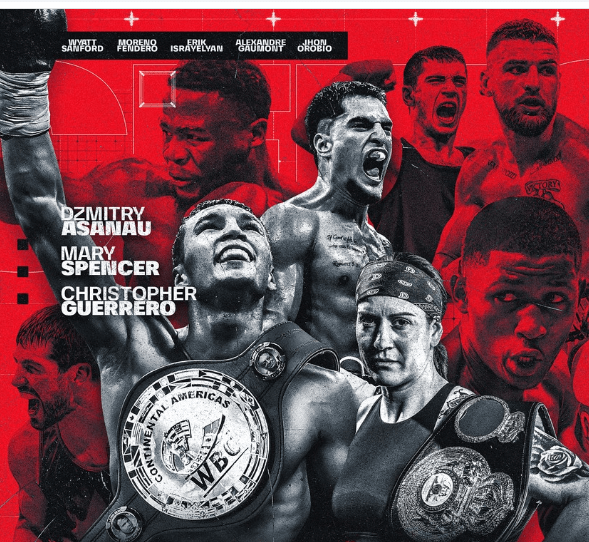
Dzmitry Asanau Flummoxes Francesco Patera on a Ho-Hum Card in Montreal
Camille Estephan’s Eye of the Tiger Promotions was at its regular pop stand at the Montreal Casino tonight. Upsets on Estephan’s cards are as rare as snow on the Sahara Desert and tonight was no exception.
The main event was a 10-round lightweight contest between Dzmitry “The Wasp” Asanau and Francesco Patera.
A second-generation prizefighter – his father was reportedly an amateur champion in Russia – Asanau, 28, had a wealth of international amateur experience and represented Belarus in the Tokyo Olympics. His punches didn’t sting like a wasp, but he had too much class for Belgium’s Patera whose claim to fame was that he went 10 rounds with current WBO lightweight champion Keyshawn Davis.
Two of the judges scored every round for the Wasp (10-0, 4 KOs) with the other seeing it 98-92. Patera falls to 30-6.
Co-Feature
Fast-rising Mexican-Canadian welterweight Christopher Guerrero was credited with three knockdowns en route to a one-sided 10-round decision over Oliver Quintana. A two-time Canadian amateur champion, Guererro improved to 14-0 (8).
The fight wasn’t quite as lopsided as what the scorecards read (99-88 and 98-89 twice). None of the knockdowns were particularly harsh and the middle one was a dubious call by the referee.
It was a quick turnaround for Guerrero who scored the best win of his career 8 weeks ago in this ring. The spunky but out-gunned Quintana, whose ledger declined to 22-4, was making his first start outside Mexico.
After his victory, Guerrero was congratulated by ringsider Terence “Bud” Crawford who has a date with Canelo Alvarez in September, purportedly in Las Vegas at the home of the NFL’s Raiders. Canelo has an intervening fight with William Scull on May 4 (May 3 in the U.S.) in Saudi Arabia.
Other Bouts of Note
In a fight without an indelible moment, Mary Spencer improved to 10-2 (6) with a lopsided decision over Ogleidis Suarez (31-6-1). The scores were 99-91 and 100-90 twice. Spencer was making the first defense of her WBA super welterweight title. (She was bumped up from an interim champion to a full champion when Terri Harper vacated the belt.)
A decorated amateur, the 40-year-old Spencer has likely reached her ceiling as a pro. A well-known sports personality in Venezuela, Suarez, 37, returned to the ring in January after a 26-month hiatus. An 18-year pro, she began her career as a junior featherweight.
In a monotonously one-sided fight, Jhon Orobio, a 21-year-old Montreal-based Colombian, advanced to 13-0 (11) with an 8-round shutout over Argentine campaigner Sebastian Aguirre (19-7). Orobio threw the kitchen sink at his rugged Argentine opponent who was never off his feet.
Wyatt Sanford
The pro debut of Nova Scotia’s Wyatt Sanford, a bronze medalist at the Paris Olympics, fell out when Sanford’s opponent was unable to make weight. The opponent, 37-year-old slug Shawn Archer, was reportedly so dehydrated that he had to be hospitalized.
To comment on this story in the Fight Forum CLICK HERE
Featured Articles
Remembering Hall of Fame Boxing Trainer Kenny Adams

The flags at the International Boxing Hall of Fame in Canastota, New York, are flying at half-staff in honor of boxing trainer Kenny Adams who passed away Monday (April 7) at age 84 at a hospice in Las Vegas. Adams was formally inducted into the Hall in June of last year but was too ill to attend the ceremony.
A native of Cape Girardeau, Missouri, Adams was a retired Army master sergeant who was part of an elite squadron that conducted many harrowing missions behind enemy lines during the Vietnam War. A two-time All-Service boxing champion, his name became more generally known in 1984 when he served as the assistant coach of the U.S. Olympic boxing team that won 11 medals, eight gold, at the Los Angeles Summer Games. In 1988, he was the head coach of the squad that won eight medals, three gold, at the Olympiad in Seoul.
Adams’ work caught the eye of Top Rank honcho Bob Arum who induced Adams to move to Las Vegas and coach a team of fledgling pros that he had recently signed. Bantamweight Eddie Cook and junior featherweight Kennedy McKinney, Adams’ first two champions, bubbled out of that pod. Both represented the U.S. Army as amateurs. McKinney was an Olympic gold medalist. Adams would eventually play an instrumental role in the development of more than two dozen world title-holders including such notables as Diego Corrales, Edwin Valero, Freddie Norwood, and Terence Crawford.
When Eddie Cook won his title from Venezuela’s 36-1 Israel Contreras, it was a big upset. Adams, the subject of a 2023 profile in these pages, was subsequently on the winning side of two upsets of far greater magnitude. He prepared French journeyman Rene Jacquot for Jacquot’s date with Donald Curry on Feb. 11 1989 and prepared Vincent Phillips for his engagement with Kostya Tszyu on May 31, 1997.
Jacquot won a unanimous decision over Curry. Phillips stopped Tszyu in the 10th frame. Both fights were named Upset of the Year by The Ring magazine.
Adams’ home-away-from-home in his final years as a boxing coach was the DLX boxing gym which opened in the summer of 2020 in a former dry cleaning establishment on the west-central side of the city. It was fortuitous to the gym’s owner Trudy Nevins that Adams happened to live a few short blocks away.
“He helped me get the place up and running,” notes Nevins who endowed a chair, as it were, in honor of her esteemed helpmate.
No one in the Las Vegas boxing community was closer to Kenny Adams than Brandon Woods. “He was a mentor to me in boxing and in life in general, a father figure,” says Woods, who currently trains Trevor McCumby and Rocky Hernandez, among others.
Akin to Adams, Woods is a Missourian. His connection to Adams comes through his amateur coach Frank Flores, a former teammate of Adams on an all-Service boxing team and an assistant under Adams with the 1988 U.S. Olympic squad.
Woods was working with Nonito Donaire when he learned that he had cancer (now in remission). He cajoled Kenny Adams out of retirement to assist with the training of the Las Vegas-based Filipino and they were subsequently in the corner of Woods’ fighter DeeJay Kriel when the South African challenged IBF 105-pound title-holder Carlos Licona at the Microsoft Theater in Los Angeles on Feb. 16, 2019.
This would be the last time they worked together in the corner and it proved to be a joyous occasion.
After 11 rounds, the heavily favored Licona, a local fighter trained by Robert Garcia, had a seemingly insurmountable lead. He was ahead by seven points on two of the scorecards. In the final round, Kriel knocked him down three times and won by TKO.
“I will always remember the pep talk that Kenny gave DeeJay before that final round,” says Woods. “He said ‘You mean to tell me that you came all the way from across the pond to get to this point and not win a title?’ but in language more colorful than that; I’m paraphrasing.”
“After the fight, Kenny said to me, ‘In all my years of training guys, I never saw that.’”
The fight attracted little attention before or after (it wasn’t the main event), but it would enter the history books. Boxing writer Eric Raskin, citing research by Steve Farhood, notes that there have been only 16 instances of a boxer winning a world title fight by way of a last-round stoppage of a bout he was losing. The most famous example is the first fight between Julio Cesar Chavez and Meldrick Taylor. Kriel vs. Licona now appears on the same list.
Brandon Woods notes that the Veterans Administration moved Adams around quite a bit in his final months, shuffling him to hospitals in North Las Vegas, Kingman, Arizona, and then Boulder City (NV) before he was placed in a hospice.
When Woods visited Adams last week, Adams could not speak. “If you can hear me, I would say to him, please blink your eyes. He blinked.
“There are a couple of people in my life I thought would never leave us and Kenny is one,” said Woods with a lump in his throat.
Photo credit: Supreme Boxing
To comment on this story in the Fight Forum CLICK HERE
Featured Articles
Weekend Recap and More with the Accent of Heavyweights

There were a lot of heavyweights in action across the globe this past weekend including six former Olympians. The big fellows added luster to a docket that was deep but included only one world title fight.
The bout that attracted the most eyeballs was the 10-rounder in Manchester between Filip Hrgovic and Joe Joyce. Hrgovic took the match on three weeks’ notice when Dillian Whyte suffered a hand injury in training and was forced to pull out.
Dillian Whyte is rugged but Joe Joyce’s promoter Frank Warren did Joe no favors by rushing Filip Hrgovic into the breach. The Croatian was arguably more skilled than Whyte and had far fewer miles on his odometer. Joyce, who needed a win badly after losing three of his previous four, would find himself in an underdog role.
This was a rematch of sorts. They had fought 12 years ago in London when both were amateurs and Joyce won a split decision in a 5-round fight. Back then, Joyce was 27 years old and Hrgovic only 20. Advantage Joyce. Twelve years later, the age gap favored the Croatian.
In his first fight with California trainer Abel Sanchez in his corner, Hrgovic had more fuel in his tank as the match wended into the late rounds and earned a unanimous decision (98-92, 97-93, 96-95), advancing his record to 18-1 (14).
It wasn’t long ago that Joe Joyce was in tall cotton. He was undefeated (15-0, 14 KOs) after stopping Joseph Parker and his resume included a stoppage of the supposedly indestructible Daniel Dubois. But since those days, things have gone haywire for the “Juggernaut.” His loss this past Saturday to Hrgovic was his fourth in his last five starts. He battled Derek Chisora on nearly even terms after getting blasted out twice by Zhilei Zhang but his match with Chisora gave further evidence that his punching resistance had deteriorated.
Joe Joyce will be 40 years old in September. He should heed the calls for him to retire. “One thing about boxing, you get to a certain age and this stuff can catch up with you,” says Frank Warren. But in his post-fight press conference, Joyce indicated that he wasn’t done yet. If history is any guide, he will be fed a soft touch or two and then be a steppingstone for one of the sport’s young guns.
The newest member of the young guns fraternity of heavyweights is Delicious Orie (yes, “Delicious” is his real name) who made his pro debut on the Joyce-Hrgovic undercard. Born in Moscow, the son of a Nigerian father and a Russian mother, Orie, 27, earned a college degree in economics before bringing home the gold medal as a super heavyweight at the 2022 Commonwealth Games. He was bounced out of the Paris Olympics in the opening round, out-pointed by an Armenian that he had previously beaten.
Orie, who stands six-foot-six, has the physical dimensions of a modern-era heavyweight. His pro debut wasn’t memorable, but he won all four rounds over the Bosnian slug he was pitted against.
Las Vegas
The fight in Las Vegas between former Olympians Richard Torrez Jr and Guido Vianello was a true crossroads fight for Torrez who had an opportunity to cement his status as the best of the current crop of U.S.-born heavyweights (a mantle he inherited by default after aging Deontay Wilder was knocked out by Zhilei Zhang following a lackluster performance against Joseph Parker and Jared Anderson turned in a listless performance against a mediocrity from Europe after getting bombed out by Martin Bakole).
Torrez, fighting in his first 10-rounder after winning all 12 of his previous fights inside the distance, out-worked Vianello to win a comfortable decision (97-92 and 98-91 twice).
Although styles make fights, it’s doubtful that Torrez will ever turn in a listless performance. Against Vianello, noted the prominent boxing writer Jake Donovan, he fought with a great sense of urgency. But his fan-friendly, come-forward style masks some obvious shortcomings. At six-foot two, he’s relatively short by today’s standards and will be hard-pressed to defeat a top-shelf opponent who is both bigger and more fluid.
Astana, Kazakhstan
Torrez’s shortcomings were exposed in his two amateur fights with six-foot-seven southpaw Bakhodir Jalolov. A two-time Olympic gold medalist, the Big Uzbek was in action this past Saturday on the undercard of Janibek Alimkhanuly’s homecoming fight with an obscure French-Congolese boxer with the impossible name of Anauel Ngamissengue. (Alimkhanuly successfully defended his IBF and WBO middleweight tiles with a fifth-round stoppage).
Jalolov (15-0, 14 KOs) was extended the distance for the first time in his career by Ukrainian butterball Ihor Shevadzutski who was knocked out in the third round by Martin Bakole in 2023. Jalolov won a lopsided decision (100-89. 97-92, 97-93), but it did not reflect well on him that he had his opponent on the canvas in the third frame but wasn’t able to capitalize.
At age 30, Jalolov is a pup by current heavyweight standards, but one wonders how he will perform against a solid pro after being fed nothing but softies throughout his pro career.
Hughie Fury
Hughie Fury, Tyson’s cousin, has been gradually working his way back into contention after missing all of 2022 and 2023 with injuries and health issues. Early in his career he went 12 in losing efforts with Joeph Parker, Kubrat Pulev, and Alexander Povetkin, but none of his last four bouts were slated for more than eight rounds.
His match this past Friday at London’s venerable York Hall with 39-year-old countryman Dan Garber was a 6-rounder. Fury reportedly entered the fight with a broken right hand, but didn’t need more than his left to defeat Garber (9-4 heading in) who was dismissed in the fifth round with a body punch. In the process, Fury settled an old family score. Their uncles had fought in 1995. It proved to be the last pro fight for John Fury (Tyson’s dad) who was defeated by Dan’s uncle Steve.
Negotiations are reportedly under way for a fight this summer in Galway, Ireland, between Hughie Fury and Dillian Whyte.
Looking Ahead
The next big heavyweight skirmish comes on May 4 in Riyadh, Saudi Arabia, where Efe Ajagba and Martin Bakole tangle underneath Canelo Alvarez’s middleweight title defense against William Scull.
Ajagba has won five straight since losing to Frank Sanchez, most recently winning a split decision over Guido Vianello. Bakole, whose signature win was a blast-out of Jared Anderson, was knocked out in two rounds by Joseph Parker at Riyadh in his last outing, but there were extenuating circumstances. A last-minute replacement for Daniel Dubois, Bakole did not have the benefit of a training camp and wasn’t in fighting shape,
At last glance, the Scottish-Congolese campaigner Bakole was a 9/2 (minus-450) favorite, a price that seems destined to come down.
On June 7, Fabio Wardley (18-0-1, 17 KOs) steps up in class to oppose Jarrell Miller (26-1-2) at the soccer stadium in Wardley’s hometown of Ipswich. In his last start in October of last year, Wardley scored a brutal first-round knockout of Frazer Clarke. This was a rematch. In their first meeting earlier that year, they fought a torrid 10-round draw, a match named the British Fight of the Tear by British boxing writers.
Miller last fought in August of last year in Los Angeles, opposing Andy Ruiz. Most in attendance thought that Miller nicked that fight, but the match was ruled a draw. For that contest, Miller was a svelte 305 ½ pounds.
Wardley vs. Miller is being framed as a WBA eliminator. Wardley, fighting on his home turf, opened an 11/5 (minus-220) favorite.
To comment on this story in the Fight Forum CLICK HERE
-
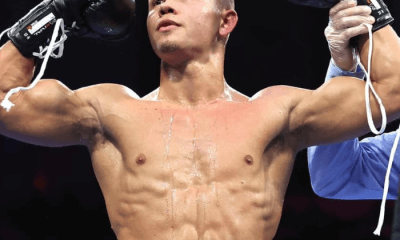
 Featured Articles4 weeks ago
Featured Articles4 weeks agoA Fresh Face on the Boxing Scene, Bryce Mills Faces His Toughest Test on Friday
-
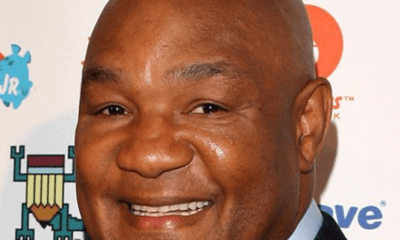
 Featured Articles3 weeks ago
Featured Articles3 weeks agoBernard Fernandez Reflects on His Special Bond with George Foreman
-
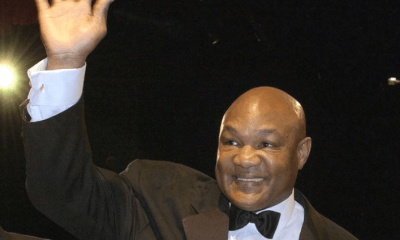
 Featured Articles3 weeks ago
Featured Articles3 weeks agoA Paean to George Foreman (1949-2025), Architect of an Amazing Second Act
-
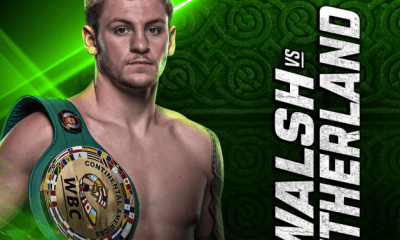
 Featured Articles4 weeks ago
Featured Articles4 weeks agoNotes and Nuggets from Thomas Hauser: Callum Walsh Returns to Madison Square Garden
-
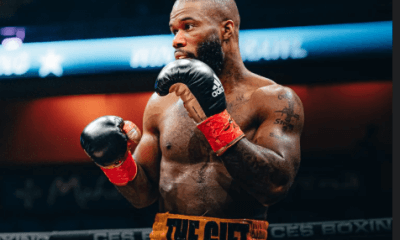
 Featured Articles3 weeks ago
Featured Articles3 weeks agoSpared Prison by a Lenient Judge, Chordale Booker Pursues a World Boxing Title
-
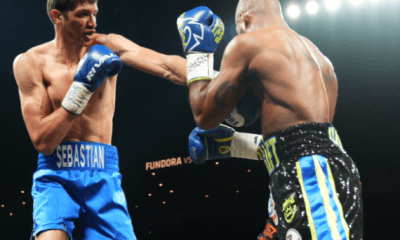
 Featured Articles3 weeks ago
Featured Articles3 weeks agoSebastian Fundora TKOs Chordale Booker in Las Vegas
-
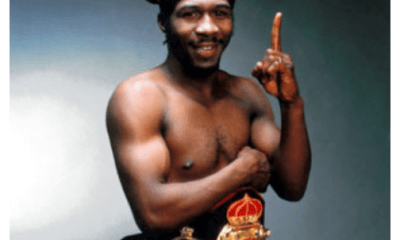
 Featured Articles2 weeks ago
Featured Articles2 weeks agoBoxing Odds and Ends: The Wacky and Sad World of Livingstone Bramble and More
-
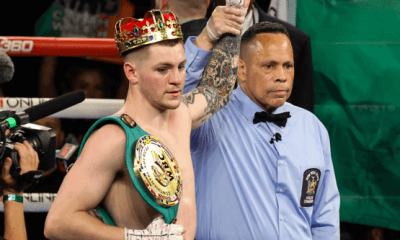
 Featured Articles4 weeks ago
Featured Articles4 weeks agoEver-Improving Callum Walsh KOs Dean Sutherland at Madison Square Garden
















